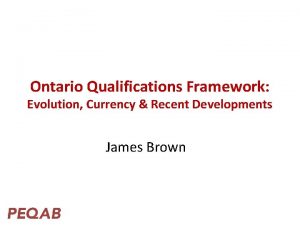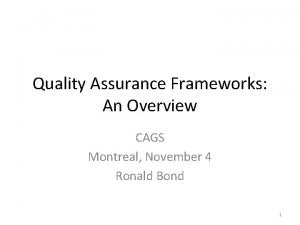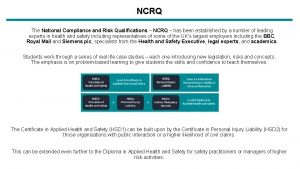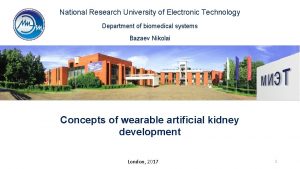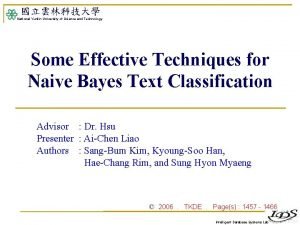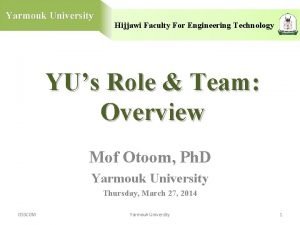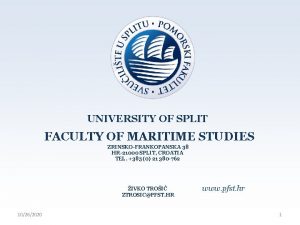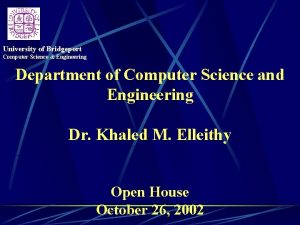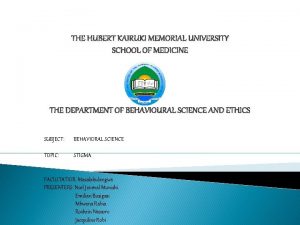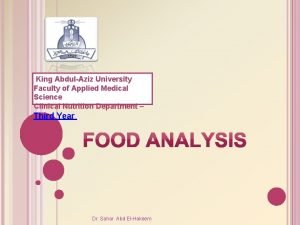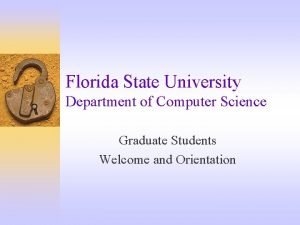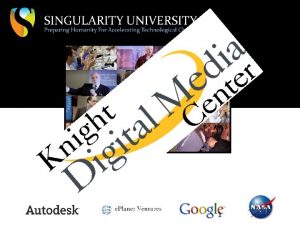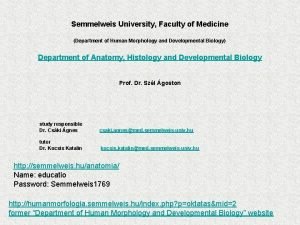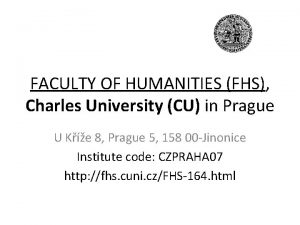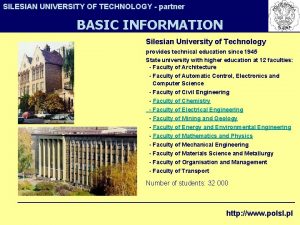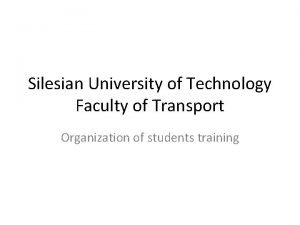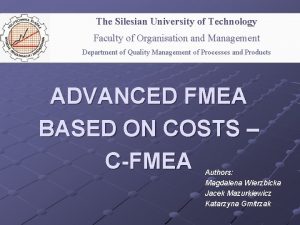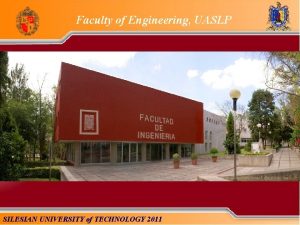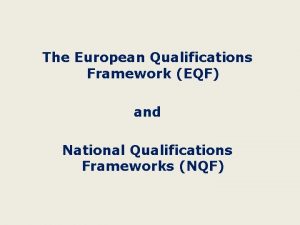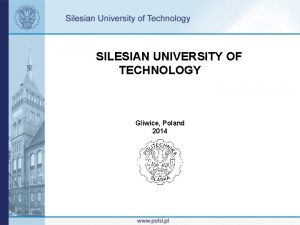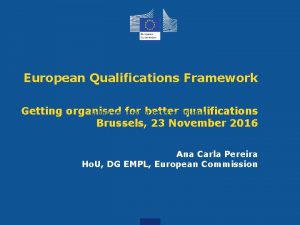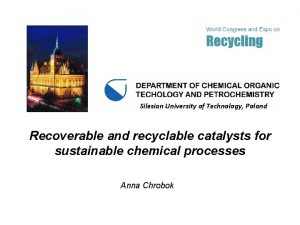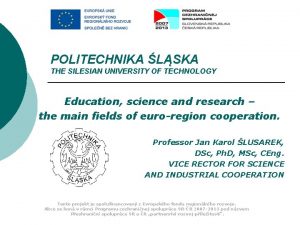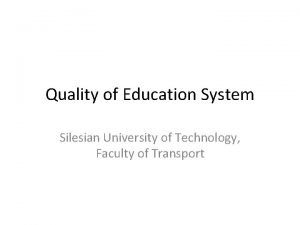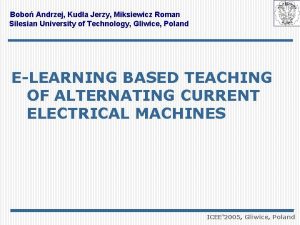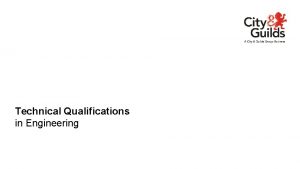National Qualifications Framework Silesian University of Technology Faculty




















- Slides: 20

National Qualifications Framework Silesian University of Technology Faculty of Transport Ph. D. Rafał Burdzik

A new way of thinking: Lifelong learning A new approach: Learning outcomes are key A new way of organising qualifications and new opportunities to gain them: The Polish Qualifications Framework

The national qualifications system will change education in Poland the Polish labour market. This is an issue that affects us all, including the generation which is now preparing to enter the labour market and those who aim to pursue lifelong learning and development What a person knows, is able to do and takes responsibility for in professional, public and personal life are most important, not what was taught at school or university or how long was spent there. The pace of change in the labour market is driving the need for new approaches to education. Of key significance are the learning outcomes we achieve throughout life – how we use our knowledge, skills and social competence. The key will be to develop, learn and gain new qualifications.

These days it is not always clear what competences lay behind a diploma or certificate, making it difficult for employers to assess whether a given candidate is the right choice for their company. Under the Polish Qualifications Framework, it will be possible to organise learning outcomes, which on the one hand will streamline the search for work and on the other will simplify the recruitment of employees capable of guaranteeing business development and strengthening their employers’ positions in the open European market. The new qualifications system will also streamline the confirmation of competences gained outside of the school system. The Polish Qualifications Framework (PQF) will ensure the cohesive organisation of learning outcomes achieved at various stages of education (general, higher and vocational). Specific learning outcomes will be required at each level, i. e. specific knowledge, skills and social competence. Those who confirm requirements at a given stage through an examination will gain a qualification – a diploma or certificate. However, the means of studying and the way in which these competences have been gained – formal (from primary school to doctoral studies), non-formal (courses, workshops, training programmes) or informal (work experience, online) – will be irrelevant.

The Polish and European qualifications frameworks Work on the Polish Qualifications Framework is part of a process covering the entire European Union, and is linked to facilitating mobility in the open EU labour market and promoting the concept of lifelong learning. The Polish Qualifications Framework will be referenced to the European Qualifications Framework (EQF), a system implemented to facilitate freedom of movement within the European labour market and to better adapt qualifications to employers’ expectations. Seeing the obvious benefit, all European Union member states are voluntarily developing frameworks and referencing reports describing the links between their national frameworks and the European framework – it is essential for the system of qualifications in Europe to be cohesive and comparable. EU member state frameworks already in existence, in the process of being implemented or still at the planning stage differ in the number of qualification levels (e. g. Ireland has 10, while Scotland has 12) and institutions. European countries also have different educational systems. The EQF is a type of “universal translator” for qualification levels and thus also learning outcomes.



Education for a new qualifications system The changes currently being made in various fields of education in Poland – from primary school to higher education – are consistent with the qualifications system being developed. An education system based on learning outcomes means that schools and universities will concentration on the effectiveness of educational activities. It will be possible to precisely define the educational outcome we want to achieve. Instead of talking about “studying subjects” or “finishing school” we will talk about “learning”.


More opportunities in higher education As a result of the amendment to the higher education law of March 18, 2011, higher education institutions were given more autonomy to develop curricula as of the 2011 -2012 academic year. They are no longer required to refer to a specific list of educational content, i. e. a central list of course names with an allocated framework of educational content that must be included in curricula. Now they are able to independently plan fields of study, taking into consideration the skills and competences a graduate will have upon graduation. Higher education institutions are bound by a universal description of the three highest levels in the national qualifications framework (i. e. doctoral, master’s, licentiate and engineering studies). Furthermore, they have sets of learning outcomes for general fields of study: the humanities, the exact sciences, social, natural sciences, technical, veterinary, medical sciences and the arts. These sets of outcomes are generalised, so that they can be applied in various areas and fields of study. For example, the field of social sciences can include law, sociology or management, while the exact sciences can include mathematics or physics.

The Polish Qualifications Framework Like the European Framework, the Polish Qualifications Framework (PQF) has eight qualification levels. The learning outcome requirements for each level are described in three categories: knowledge, skills and social competence. A full qualification means that a person meets the requirements relating to knowledge, skills and social competence at a given level: both the universal requirements and those specifically assigned to the selected educational pathway of vocational, general (to level four) or higher education (required to gain qualifications at subsequent levels).

The Polish Qualifications Framework


COURSE DESCRIPTION

COURSE DESCRIPTION

COURSE DESCRIPTION

What the new qualifications system will change • • • The procedures for assessing and recognising the achievements of learners will be based on learning outcomes, which specify what a certificate or diploma holder knows, understands and is capable of. Each jobseeker in the open European labour market will be able to hold qualifications which are comprehensible to employers: at present it is frequently impossible to make a comparison between countries, which hinders Polish workers in the European labour market. � A new approach to the learning process: the education system will encourage lifelong learning. � Various learning pathways will be treated equally: it will cease to be important whether a given qualification has been gained at university, through a training programme or at home. A system for recognising competences gained outside of the formal education system will be created. � There will be fundamental change in the vocational training market: training, which at present is frequently at a low level, will be adapted to the requirements of the labour market, and will support the actual broadening of competences. Specific skills will be required of training coordinators and lecturers, and thus they will also have to adapt to the new system of assessment and verification of competences. Employers will also benefit: they will know whether the expensive employee training they are financing will generate specific benefits for them and for their employees.

Conclusion: As a result of the Polish Qualifications Framework: ■ diplomas and certificates will provide a clear message to employers, confirming the actual competences of graduates, ■ anyone seeking work in the European market will be able to present his or her qualifications in a way employers will be able to understand, ■ each person will be able to acquire new qualifications his or her qualifications not only through school and training, but also by being able to validate competences achieved through non-formal (for example, courses) and informal (at work, in everyday life) pathways by taking exams at specific institutions.

Diploma = Qualifications

Silesian University of Technology Faculty of Transport 8 Krasińskiego Str. 40 -019 Katowice, Poland tel. /fax: +48 32 603 4166 Dean's representative for National Qualifications Framework Ph. D. Rafał Burdzik E-mail: rafal. burdzik@polsl. pl www. polsl. pl/rt
 Eqf
Eqf National qualifications framework
National qualifications framework Ontario qualifications framework
Ontario qualifications framework Ontario qualifications framework
Ontario qualifications framework Ncrq diploma assignments
Ncrq diploma assignments National research university of electronic technology
National research university of electronic technology National yunlin university of science and technology
National yunlin university of science and technology Hijjawi faculty for engineering technology
Hijjawi faculty for engineering technology University of split faculty of maritime studies
University of split faculty of maritime studies University of bridgeport computer science faculty
University of bridgeport computer science faculty Bridgeport university computer science
Bridgeport university computer science Hubert kairuki memorial university faculty of medicine
Hubert kairuki memorial university faculty of medicine Semmelweis university faculty of medicine
Semmelweis university faculty of medicine King abdulaziz university faculty of medicine
King abdulaziz university faculty of medicine Computer science fsu
Computer science fsu Mendel university faculty of business and economics
Mendel university faculty of business and economics Singularity university faculty
Singularity university faculty Agnes csaki semmelweis
Agnes csaki semmelweis Ascaris lumbricoides ova
Ascaris lumbricoides ova Feup university of porto
Feup university of porto Webkredit cuni
Webkredit cuni


